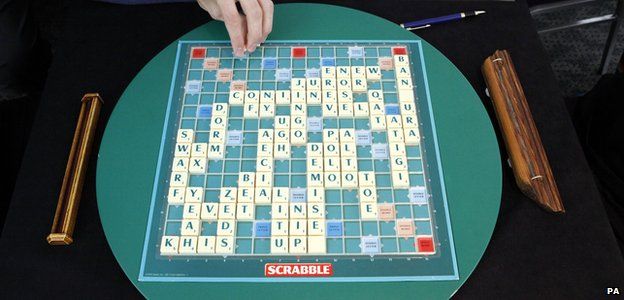Weird short words in Scrabble finale
- Published

The final game of the British National Scrabble Championships hinged on the word "coniines". Few people will know what it means. Neither, perhaps did the two players. So here is a translation of the 12 most obscure words on that final board, writes Tom de Castella.
Aecia: A fruiting body of a rust fungus
Coniines: Alkaloid that makes up the poisonous part of hemlock
Vela: Plural of velum, a glass screen
Zeds: Name of the letter Z, plural
Khis: Plural of khi, a letter in the Greek alphabet
Fy: To digest
Enew: (Hawk) Falconry term for driving a bird into the water
Qat: variant spelling of khat, a plant whose leaves are chewed as a stimulant
Litu: Plural of Litas, a former silver coin and monetary unit of Lithuania
Atigi: Parka worn by the Inuits in northern Canada
Bandura: Ukrainian lute
Swarf: A swoon; grit abraded from an axle
The margins can be fine. The official Scrabble dictionary is published by Collins. But not all the words played on that final board exist in the Oxford English Dictionary.
"We don't yet have entries in the OED for atigi or bandura, but we've done some research on both, and they may well be added to the OED soon," says Dr Philip Durkin principal etymologist at the OED.
Litas is missing, as is khi - the OED prefers the spelling chi for the Greek letter.
Sam Richardson, publisher at Chambers, which used to produce the game's official dictionary, says there's always pressure to include new words purely for their usefulness in Scrabble. But the dictionaries always stand firm until a word has wider useage, he says.
There is one major difference between a Scrabble dictionary and a conventional English dictionary. Once a word gets into the Scrabble Dictionary, it never drops out. "Scrabble players don't like to unlearn words," says Elaine Higgleton, publisher at Collins, which produces the current Scrabble Dictionary. The exception is for words mistakenly included. One such was "pH", Higgleton says. It used to be there because it didn't start with a capital and hence couldn't be classed as a proper noun. But in the 1990s it was taken out when someone realised it was an abbreviation, she says.
Players often learn lists of words, paying no heed to meaning. Some of the world's best Scrabble players are Thai and can't speak English. An article in Slate even suggested that understanding English is a disadvantage at the very top level of the game.
Purists may bridle at obscure words being thrown around by players who have no inkling what they mean. But there's nothing to stop part-time players using house rules, says Higgleton. Rule one might be, whosover places tiles on the sacred board, must be able to provide a ballpark definition of said word.
It'll sort the banduras from the banditos.
Follow @BBCNewsMagazine on Twitter and on Facebook